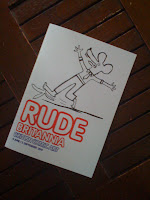 Today I received news that the company I work for are considering paying towards a Spanish language course for me. This got me thinking.
Today I received news that the company I work for are considering paying towards a Spanish language course for me. This got me thinking. Once upon a time, there was a tribe of cavemen, cavewomen and cavebabies who lived in an nice area that would one day be known as England. They communicated using gestures, facial expressions and grunting which suited them just fine. Until one day, from the mist and darkness that surrounded their home, they heard one of their number shout 'ROCK'. He had returned from the hunt not with mammoth for dinner (which his wife had specifically requested) but with his newly-christened pebble and a word. At roughly the same time, not so far away - just a hop, skip and a jump across the Caveman Channel - another brainy caveman (this time a cavehomme) returned with a similar object and shouted 'PIERRE!'
This happened all over the place, with every brainy cavehombre, caveuomo and caveotoko coming up with a different sound to describe the object in his hands. And lo, language was born, and cavemen all over the world began to argue over the correct words for flowers, stars and mammoths. And it didn't stop there. Oh no. Somewhat more than a few years later, though they had left the caves and eaten all the mammoth, the descendants of said cavemen were coming up with new words to describe various new-fangled technologies that enabled them to communicate their thoughts in 140 characters or less, or even be virtual friends with people they hadn't seen since their sixth birthday party.
Now, take a few seconds to re-read the above and ensure that you've really grasped the thoroughly researched, completely accurate history of language that I've just given, and then consider how strange it is. I am completely fascinated by language - how it evolves, travels and mutates. I'm in awe of its ability to overcome every obstacle thrown at it and how quickly new terms and phrases can become commonplace.
But what intrigues me most is the differences between one language and another. I can't even begin to imagine how it came about. I studied French and Italian at university and even though they share a common ancestor in Latin, they're pretty bloody different. Not as different as French is to Hindi, of course, but you know what I mean; as powerful and resilient as a language is, it's also extremely vulnerable to external influence - hence, I imagine, why Latin didn't survive unaltered after the fall of the Roman Empire and why English-speakers still use words that were originally Persian or German. It's organic and always changing, new words invented and others forgotten.
At this point I stopped thinking, as I'd confused myself, and had a nap.
I must add that my appreciation of the organic, changing nature of language does not, extend to 'refudiate' - Shakespeare may have invented words, but the chances are he meant to invent them, you daft mare.












